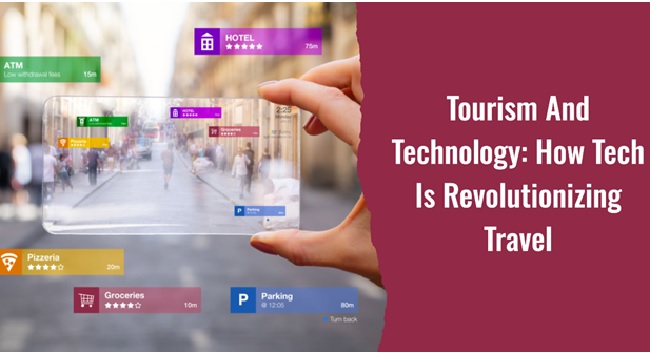Tourism today depends on many factors, and technology is one of the most important. Therefore, players in the travel industry must keep up with the changes happening each day. The secret is understanding travel Tech trends and getting on board almost immediately.
However, it all starts with understanding the relationship between tourism and technology. Generally, technology is at the forefront of the travel revolution. As new technologies in the travel world keep coming up, it is vital to take advantage of them since competitors will.

You can significantly improve your Business by incorporating these new technologies into daily operations. Keep reading to know what technologies to use when operating in this industry.
Read Also:
Understanding the Latest Tech Trends in the Travel Industry
Trends are general developments in specific spaces and sectors with a significant potential to influence behaviors in that sector. Just like several factors influence behaviors in the hospitality industry, tech trends in the travel industry have a significant impact on how things are done.

Some Popular emerging innovative travel technology choices to tap into include virtual reality, voice search, the Internet of Things, facial recognition, and other aspects of smart technology.
Services in the travel industry are much more smooth and faster compared to how they were before. Highlighted below are a few of the most critical trends in the industry that all key players must pay attention to.
1. Voice Search and Control
The technologies applicable in this industry include AI, smart speakers, and smartphones. These technologies have made voice search even more relevant in today’s travel world. Many customers today use voice search to book hotels, airline tickets, and travel experiences.
Companies and industry players, therefore, need to invest in Website designs that accommodate or take advantage of the trend. Note that voice control also plays a significant role in travelers’ experiences. For example, in hotels, some devices are controlled by voice.
Things such as lighting and air conditioning can be controlled by voice search. Such conveniences can help visitors choose specific areas over others, meaning businesses that have incorporated voice search are likely to have more customers than those that don’t.
2. Contactless Payments
Travelers are finding contactless payment more convenient and safe, hence a large move toward businesses adopting this payment system. Usually, payment is swift, saving time and giving travelers a great experience.
3. Virtual Reality
This emerging technology has impacted different industries and continues to play a significant role in the tourism sector. It offers travelers an opportunity to experience different locations, far away from them, without necessarily having to leave their homes for this.
With a taste of the possible experiences, they are likely to help most people make an informed choice. This can be the difference between visiting a specific area over another. Virtual reality tours are great as they allow potential travelers to experience different places before committing.



This lowers disappointments and helps many manage their expectations even as they travel. Businesses that use such technologies will likely thrive in an ever-changing industry. Research extensively to know how best to tap into this provision and take advantage of it.
4. AI chatbot
If there is one tech investment anyone in the travel industry must make, it has to be the AI chatbot. Customers today want answers immediately. These answers must always be accurate and helpful. Unfortunately, you may not always be available to answer all questions promptly; that is where the chat box comes in.
These chatbots can operate 24/7, offering quick responses quickly on a need basis. Such is the efficiency that cannot be attained by human capacity. All that must be done is equip them with answers to standard questions and ensure they can answer close to humans.
While AI chatbots are imperfect, the technology continues to improve each day, meaning it gets better with time. One area they are good at is responding to inquiries about policies and procedures that remainlargely unchanged.
5. Internet of Things
This is certainly one of the most exciting technologies today. It revolves around the connectivity of different devices. The connection makes it possible to send as well as receive information/data. Its role in the tourism industry cannot be downplayed.



For example, the technology is utilized in hotel rooms to link essential items such as the air conditioner, heater, and lights for centralized control.
This guarantees seamless functionality, as visitors don’t have to master too many things when they only want to relax. Airports also benefit from this technology when sensors are connected to luggage cases and different areas to alert when passengers pass by.
6. ArtificialIntelligence (AI)
Artificial intelligence is one of the major players in the tourism industry. It involves the use of robots and other techs to make work easier. The most obvious way AI is used in the travel industry has to be in customer care.
Query responses, learning customer behaviors, and customer interaction are the biggest gain for the industry. Leveraging AI in the travel sector will positively lead to better customer satisfaction.
7. Big Data
Modern tourism management is complex and relies on data to thrive. Only companies that employ the latest data technologies can stay ahead of the Game. Personalizing data gives service providers an edge as they can respond to each client’s specific needs.



Analyzing data for hotel performance also makes it possible for the business to adjust and make changes that work better for the establishment and the customers. This level of predictability allows the business to operate at all times profitably.
Read Also:
Final Thoughts
Technology is asignificant player in the tourism industry, no doubt. However, stakeholders have to carefully identify the tasks that work for them. When properly applied, some of these have more benefits and take the business to the next level.



















